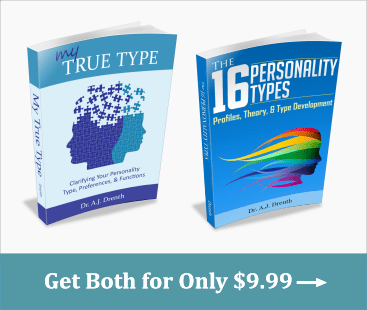
Introverts are commonly cast as introspective souls for whom self-awareness comes quite naturally. While I don’t disagree that Introverts have a leg up on Extraverts in this regard, we shouldn’t pretend that all Introverts are highly self-aware. If we turn to the Enneagram, for instance, we learn that Fives, and especially Enneagram Fours, are among the most introspective and self-aware types. But there are plenty of Introverts in other Enneagram zones (e.g., Ones, Sixes, Nines) who may be less self-oriented or self-aware.
So what is it, we might ask, that propels some Introverts toward higher levels of self-awareness?
Contributors to Introverts’ Self-Awareness
Considering that most personality traits have a substantial genetic underpinning, we might expect the same to be true for self-awareness. Research suggests, for instance, that what the Big Five calls Neuroticism (others have called it Turbulence or Sensitivity) has a robust genetic component and plays a role in worry, rumination, and mind-wandering. As discussed in most post on Introvert (I) – Extravert (E) differences, Introverts often report higher levels of Neuroticism, negative emotions, withdrawal, and rumination—all of which may contribute to their propensity for introspection and self-attunement. We might say there’s a price to be paid for self-awareness in the form of negative moods, thoughts, and emotions that call out for the Introvert’s attention.
As most of our navel-gazing readers are likely aware, a common companion and ostensible downside of self-awareness is self-consciousness. Namely, Introverts may find it difficult to fully and confidently be themselves if they’re self-consciously observing and critiquing themselves in social situations. Self-consciousness is like carefully watching oneself act in a movie while simultaneously trying to engage with others. It can thus be hard for Introverts to feel socially comfortable when they’re constantly getting tripped up by their own self-critiques. This is why Introverts do better socially in those fortuitous moments when they manage to check their self-consciousness at the door and get lost in what’s happening around them à la Extraverts. Of course, this comes with the inherent risk of saying or doing something they might later regret.
In addition to genetic factors like trait Neuroticism, life experiences play a seminal role in facilitating Introverts’ self-awareness. Here again, it’s typically negative experiences that are the most formative. What Introverts determine to be a negative experience, however, may vary with the eye of the beholder, as the following example will illustrate.
Despite growing up in the same household and witnessing essentially the same things, my sister (INFP) and I (INTP) had very different responses to my father’s attitudes and actions. When we recently sat down to compare notes about our upbringing, I was shocked to learn how patently different our interpretations were. My sister’s take was thoroughly empathetic and optimistic. From where I sat, it bordered on naïve. My view was decidedly more critical, fueling what might be described as an “I want to be better / different” mindset. Even as a relatively young child, this impelled me to start watching and critiquing myself in a way not unlike what I was doing to my father. Simply put, this “negative” life experience convinced me that self-awareness was indispensable for living optimally and becoming a respectable human.
Of course, underlying every negative life experience are negative feelings. And since many Introverts are predisposed or more sensitive to negative emotions, they’re more likely to interpret certain life experiences in a critical or negative fashion (just as Extraverts can be disposed to unbridled optimism). So even though self-awareness may, at first blush, seem far removed from negative emotionality, they often go hand-in-hand. Negative emotions beg for analysis and understanding. And Introverts (especially Intuitive Introverts) are inclined to take the bait and assume the role of self-investigator.
Introverted artists are known to be among the most self-aware personalities. They notoriously draw on past hurts and grievances as grist for their creative mills. They can also be rather tortured souls , however, so we might think twice before adopting them as objects of envy. Interestingly, the optimal state for creativity—the creative flow state—is typically devoid of self-consciousness. When deeply immersed in flow, we “lose ourselves” in whatever we’re focusing on. The artist’s habitual mode of self-focus must therefore fall away before their creative muse will agree to pay them a visit.
Clearly, self-awareness can be both a blessing and a curse for Introverts—socially, creatively, and otherwise. As we’ve seen, it can easily devolve into self-consciousness which can stir up negative emotions and undermine self-esteem. This doesn’t mean, however, that self-awareness is the enemy or that Introverts would ultimately be better off without it. Instead, Introverts should find ways of better handling the negative emotions that repeatedly derail them. It’s ironic that doing so happens to require an ample measure of self-awareness. So what may seem to be a source of problems for Introverts turns out to be a key for resolving them.
How to Approach Negative Emotions
Emotions, whether positive or negative, are among life’s great teachers. They can teach us something about the world, about others, about ourselves, and about how to live better. So merely avoiding or dismissing negative emotions is rarely the right move. But neither is merging with our emotions to the point where we lose all objectivity and perspective. The sweet spot, if you will, lies somewhere between emotional avoidance and complete immersion.
A powerful tool for finding this sweet spot is curiosity. Bringing an attitude of curiosity and openness to our emotional responses can help loosen whatever grip they have on us. Formulating and exploring questions about the origins and appropriateness of an emotion paves the way for insight and understanding to emerge. In the same way that communicating with our romantic partners can usher in greater harmony and understanding, dialoguing with our emotions opens the door to inner peace and well-being. Indeed, this is one of best ways for Introverts to capitalize on their powers of self-awareness, renouncing victimhood and heeding the call for inner exploration and integration.
Learn more about Introverts and the Introverted types—their personalities, struggles, and paths to growth—in our books:
My True Type: Clarifying Your Personality Type, Preferences & Functions
The 16 Personality Types: Profiles, Theory & Type Development
Related Posts:
Introvert (I) – Extravert (E) Differences: Jung’s Theory, Neuroticism & Creativity
